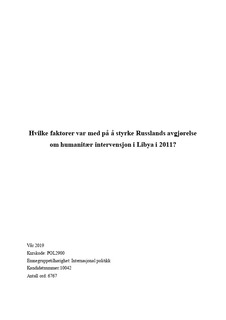| dc.contributor.advisor | Jakobsen, Jo | |
| dc.contributor.author | Hammerlund, Johanne Sætre | |
| dc.date.accessioned | 2019-09-06T14:11:41Z | |
| dc.date.available | 2019-09-06T14:11:41Z | |
| dc.date.issued | 2019 | |
| dc.identifier.uri | http://hdl.handle.net/11250/2613594 | |
| dc.description.abstract | Våren 2011 brøt det ut fredelige demonstrasjoner mot sittende regjering i Libya. Demonstrasjonene eskalerte raskt til voldelige opprør, grunnet den harde responsen fra styresmaktene i landet. Situasjonen i Libya ble raskt satt på dagsordenen til FNs sikkerhetsråd. Den 26. februar ble resolusjon 1970 vedtatt. På bakgrunn av negativ respons fra regjeringen i Libya, ble resolusjon 1973 vedtatt 17.mars 2011. For første gang i historien refererte FNs sikkerhetsråd til prinsippet om Responsibility to protect ved resolusjon 1973. Det var 10 nasjoner som stemte for resolusjonen, mens fem medlemsland avsto å stemme. Russland var én av de fem som avsto å stemme for resolusjon 1973. Russland er generelt svært skeptisk til å intervenere andre land, og henviser ofte til suverenitetsprinsippet. Hva var det som gjorde konflikten i Libya annerledes enn andre konflikter for Russland? Oppgaven legger vekt på fire variabler som kan ha vært avgjørende for Russland i avgjørelsen om intervensjon. Disse variablene er: 1) trusselen mot sivile, 2) betydningen av folkerett, 3) Russlands nasjonale interesser, og 4) betydningen av regionale organisasjoner. | |
| dc.description.abstract | During the spring of 2011 several demonstrations began in opposition to the Libyan government. The Libyan government answered the protesters with violence, and it quickly led to great suffer for the civilians. As a result, the situation in Libya became an area of the United Nation Security Council’s (UNSC) matter. Resolution 1970 was adopted by the UNSC on 26th of February 2011. The Libyan government didn’t want to accept the terms of resolution 1970, and kept the violence going. The 17th of March 2011 was the first time in history that the UNSC referred to the principle of Responsibility to Protect in the adoption of resolution 1973. 10 nations voted for the resolution, and five nations abstained from voting. Russia was one of the countries that abstained from voting. Russia has historically been sceptical of intervening other countries, and often refers to the principle of sovereignty. What made the conflict in Libya a different matter for Russia, compared to similar conflicts in other countries? This study will focus on four variables that can help to explain why Russia acted the way they did in Libya. The variables are: 1) threats towards civilians, 2) the importance of international law, 3) national interests of Russia, and 4) the importance of regional organizations. | |
| dc.language | nob | |
| dc.publisher | NTNU | |
| dc.title | Hvilke faktorer var med på å styrke Russlands avgjørelse om humanitær intervensjon i Libya i 2011? | |
| dc.type | Bachelor thesis | |
